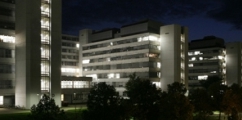CeBiTec – Colloquium
(unscheduled)
(unscheduled)
Tuesday, January 9, 2018, 17 c.t.
G2-104, CeBiTec Building
Dr. Jennifer Selinski
ARC Centre of Excellence in Plant Energy
Biology School of Life Science
La Trobe University, Bundoora (Australia)
Biology School of Life Science
La Trobe University, Bundoora (Australia)
Isoform-specific differences between Alternative Oxidase proteins
The cyanide-insensitive alternative oxidase (AOX) is a non-proton-pumping ubiquinol oxidase that allows plants to respire without mitochondrial ATP production, improving plant performance under adverse growth conditions. AOX catalyzes the reduction of oxygen to water and is post-translationally regulated by redox mechanisms and 2-oxo acids.
Arabidopsis thaliana possesses five AOX isoforms (AOX1A-D and AOX2). AOX1D expression is increased in aox1a knock-out mutants from A. thaliana (especially after restriction of the cytochrome c pathway), but cannot compensate for the lack of AOX1A, suggesting a difference in regulation of these isoforms. Therefore, we analysed the different AOX isoenzymes with the aim to identify differences in their post-translational regulation.
At the protein level, AOX activity is mainly negatively controlled. Its primary structure is not optimal for activity since changes in a single amino acid dramatically increases activity. Furthermore, the activity can be largely increased via various metabolites, e.g. TCA-cycle intermediates that act in an isoform-specific manner. Various tricarboxylic acid cycle intermediates were tested for their influence on AOX1A, AOX1C, and AOX1D wild-type protein activity, using a refined in vitro system. AOX1C is insensitive to all tested organic acids, AOX1A and AOX1D are both activated by 2-oxoglutarate, but only AOX1A is additionally activated by oxaloacetate.
In summary, we show that AOX isoforms from Arabidopsis are differentially fine-regulated by TCA cycle metabolites (most likely depending on the N-terminal region around the highly conserved cysteine residues known to be involved in regulation by the 2-oxo acids pyruvate and glyoxylate) and propose that this is the main reason why they cannot functionally compensate for each other.
Arabidopsis thaliana possesses five AOX isoforms (AOX1A-D and AOX2). AOX1D expression is increased in aox1a knock-out mutants from A. thaliana (especially after restriction of the cytochrome c pathway), but cannot compensate for the lack of AOX1A, suggesting a difference in regulation of these isoforms. Therefore, we analysed the different AOX isoenzymes with the aim to identify differences in their post-translational regulation.
At the protein level, AOX activity is mainly negatively controlled. Its primary structure is not optimal for activity since changes in a single amino acid dramatically increases activity. Furthermore, the activity can be largely increased via various metabolites, e.g. TCA-cycle intermediates that act in an isoform-specific manner. Various tricarboxylic acid cycle intermediates were tested for their influence on AOX1A, AOX1C, and AOX1D wild-type protein activity, using a refined in vitro system. AOX1C is insensitive to all tested organic acids, AOX1A and AOX1D are both activated by 2-oxoglutarate, but only AOX1A is additionally activated by oxaloacetate.
In summary, we show that AOX isoforms from Arabidopsis are differentially fine-regulated by TCA cycle metabolites (most likely depending on the N-terminal region around the highly conserved cysteine residues known to be involved in regulation by the 2-oxo acids pyruvate and glyoxylate) and propose that this is the main reason why they cannot functionally compensate for each other.
Host: Prof. Dr. Bernd Weisshaar



